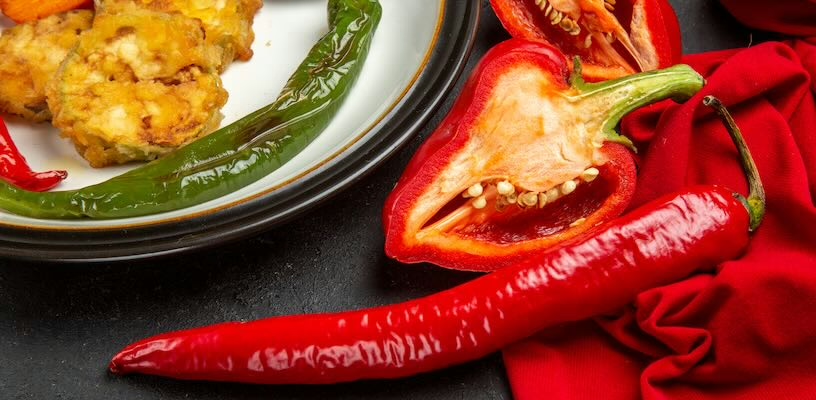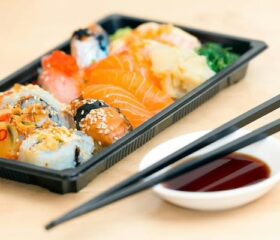Can Pregnant Women Eat Spicy Food? Risks, Benefits, and Myths
Pregnancy brings about a whirlwind of changes, including to your taste buds. Suddenly, you might find yourself reaching for the hot sauce more often, even if you weren't a spicy food fanatic before.

- Is spicy food safe for you and your baby?
- Are there any risks if you eat too much spicy food during pregnancy?
- When to call your doctor about your reaction to spicy food
- Are there any benefits to eating spicy food during pregnancy?
- Can eating spicy food help you induce labor?
- Does craving spicy food mean you’re having a boy?
- Final thoughts
Although there are plenty of things you shouldn’t do while you’re pregnant, thankfully, eating spicy foods isn’t one of them. It’s safe to indulge your cravings for fiery foods while you’re expecting—in most cases, at least.
Here’s what you need to know about eating spicy food during pregnancy, including the possible risks and benefits, as well as the truths behind some popular myths.
Is spicy food safe for you and your baby?
Yes, eating spicy food during pregnancy is safe for your baby.
While some people believe that a pregnancy diet full of spicy food can cause birth defects (as severe as blindness, according to some claims), there’s no evidence to suggest that. 1 2 There’s nothing about spicy food that will harm your little one.
The truth is that indulging in your spicy cravings will probably affect you and your bowels more than your baby.
You still need to exercise caution, though. Eating too much of anything can affect your health negatively, and spicy food—like almost everything—is something you should enjoy responsibly, in moderation.
Be careful about taking supplements made from spices during pregnancy
Don’t take any herbal supplements without talking to your doctor first. While using spices in normal cooking is generally safe, some, like fennel and turmeric, may have potential risks during pregnancy when taken in (concentrated) supplement form. Again, always consult your doctor before taking supplements (or any over-the-counter medicine or alternative remedy) during pregnancy.
Are there any risks if you eat too much spicy food during pregnancy?
Although spicy food won’t hurt your baby, eating too much can cause issues like indigestion and abdominal pain, burning diarrhea, and—if you really overdo it—vomiting can result.
This can exacerbate common issues during pregnancy, including:
- Heartburn: Pregnancy hormones relax the valve between your esophagus and stomach, which makes it easier for stomach acid to creep up and cause this burning sensation. Eating spicy foods can amplify the burn. 3 Since heartburn can start early on in pregnancy, you might have to skip spicy foods entirely if you’re experiencing it in the first trimester.
- Gastroesophageal reflux disease (GERD): This disease is a more aggravated form of heartburn (i.e., gastroesophageal reflux or acid reflux). It can cause symptoms like dry cough, burping, and difficulty or pain when swallowing. 4 5 GERD is common during pregnancy, and here again, spicy foods may worsen your symptoms. 6
- Nausea: Spicy foods can sometimes trigger nausea, especially in the first trimester when morning sickness is common. 7 8
These reactions don’t mean that spicy foods are off the table. It just comes down to what you can comfortably tolerate. It’s probably best to skip spicy foods if you have an upset stomach, irritable bowel syndrome (IBS), or inflammatory bowel disease (IBD), since spicy foods can dial up those conditions’ symptoms. 9
If, like some pregnant women, you find yourself craving spicy foods even if you never liked them before, start slow with small portions and gradually increase the heat as you build up your tolerance to it.
To temper the burn, keep milk, yogurt, or starchy foods like bread or rice nearby. Avoid unpasteurized dairy products and ice cream (which top the list of foods to avoid during your pregnancy), as they can put you at risk of contracting listeriosis, a disease that can be life-threatening for your baby. 10
Why you need to choose your hot sauce and spices carefully
Note that many hot sauces and packaged seasonings are high in sodium or other ingredients that can contribute to high blood pressure when you have too much of them. 11 High blood pressure in pregnancy, also called gestational hypertension, can result in complications for both you and your baby.
To reiterate, the spice isn’t the problem in these condiments—the sodium is. Watch how much hot sauce and seasoning you use, and read the label to make sure you’re not exceeding your recommended daily sodium intake of 2,300 mg. 12
Consider recording how much you eat in a pregnancy tracker app so you don’t go over the limit.
When to call your doctor about your reaction to spicy food
See your doctor immediately if you experience any severe reactions to spicy foods, including: 13 14 15 Severe or persistent heartburn
- Severe abdominal pain
- Diarrhea
- Constipation
- Vomiting
- Difficulty swallowing
- Wheezing, shortness of breath, or trouble breathing
- Bloody stool
You should also seek medical attention if you have severe or recurring headaches, heartburn, fatigue, gas, cramping, irritability, or bloating, as these can be signs that you have a food intolerance issue. 13
Possible signs of high blood pressure
Remember that overindulgence in the sodium in those hot sauces and packaged seasonings can cause high blood pressure, which the Centers for Disease Control and Prevention (CDC) defines as having 140/90 mm Hg or higher in two readings that are 4 or more hours apart. 16
If you don’t have a blood pressure monitor, watch out for these signs of high blood pressure: 17
- Severe, persistent headache
- Changes in your vision (blurring, spots, or seeing halos)
- Sudden swelling of the hands and face
- Pain in the upper right abdomen
- Rapid weight gain (more than 5 pounds in a week)
See your doctor immediately if you experience any of these symptoms.
Are there any benefits to eating spicy food during pregnancy?
Interestingly, there might be some benefits to including spice in your pregnancy diet, such as helping you manage your weight by boosting your metabolism and controlling your appetite. Spicy food may even improve your heart health, lower your levels of bad cholesterol, and reduce your risk of cancer. 11 14 18 19
Spicy food may also benefit:
- Inflammation: Many spicy peppers contain capsaicin, a compound known for its anti-inflammatory effects. There’s some evidence that this may boost both your and your baby’s immune systems. 20
- Your mood: Capsaicin can trigger the release of dopamine and endorphins, those “feel-good” hormones that can elevate your mood and even offer pain relief. 21 22
- Your baby’s palate: Research suggests that flavors from your diet can transfer to your baby through the amniotic fluid. 23 Introducing your baby to a variety of flavors may influence her taste preferences later in life and encourage her to be a more adventurous eater.
Certain spicy foods can also offer additional benefits. For instance, not only is the Korean staple kimchi safe to eat while pregnant, but it’s packed full of probiotics that may benefit your “good” gut bacteria.
Can eating spicy food help you induce labor?
No, eating spicy foods won’t send you into labor. While this is a popular belief, there’s no scientific evidence to support it. 24
It’s true that the capsaicin in spicy foods may trigger cramps (along with a whole other set of digestive issues) and potentially stimulate contractions, which are usually signs of labor. 14 25 However, these contractions aren’t enough to jumpstart labor, so you don’t need to worry.
Does craving spicy food mean you’re having a boy?
No, you can’t predict your baby’s sex based on your cravings. Some people believe that your baby will be a boy if you crave foods that are spicy, salty, sour (like lemons), or rich in protein (like meat), but there’s not a lot of scientific evidence backing up the link between cravings and your baby’s sex. 26 27 28
This is an interesting old wives’ tale, along with many others that swear there are definitive signs of having a boy or girl, but it’s one that’s based on anecdotal evidence at best. The only way to tell if you’re having a boy or girl is to wait for your doctor to confirm it for you with a gender scan or other procedure.
Final thoughts
If you’re craving spicy food during pregnancy and can tolerate it without significant discomfort, go ahead and enjoy it. It’s unlikely to harm your baby and might even offer some benefits. Just listen to your body, start slow if you’re not used to the heat, and be mindful of any potential side effects.
As always, if you have any concerns, don’t hesitate to reach out to your doctor.
Article Sources
- University of Utah Health. "Which Pregnancy Myths Are Actually True?" Retrieved September 12, 2025.
- The Pennsylvania State University. "The Medical Minute: Myths, realities of birth defects" Retrieved September 12, 2025.
- University of Rochester Medical Center. "Pregnancy and Heartburn" Retrieved September 12, 2025.
- Northwestern Medicine. "What Is Gastroesophageal Reflux Disease (GERD)?" Retrieved September 12, 2025.
- Northwestern Medicine. "Symptoms of Gastroesophageal Reflux Disease (GERD)" Retrieved September 12, 2025.
- Northwestern Medicine. "An OB-GYN's Guide to Cravings During Pregnancy" Retrieved September 12, 2025.
- Children's Hospital of Philadelphia. "Common Discomforts During Pregnancy" Retrieved September 12, 2025.
- Minnesota WIC. "Nausea & Vomiting During Pregnancy" Retrieved September 12, 2025.
- University of Chicago Medicine. "A hot topic: Are spicy foods healthy or dangerous?" Retrieved September 12, 2025.
- U.S. Food and Drug Administration. "Listeria (Food Safety for Moms-to-Be)" Retrieved September 12, 2025.
- Cleveland Clinic. "Is Spicy Food Good for You?" Retrieved September 12, 2025.
- U.S. Department of Veterans Affairs. "Prenatal Nutrition Goals" Retrieved September 12, 2025.
- ColumbiaDoctors. "Can A Food Be Too Spicy to Eat?" Retrieved September 12, 2025.
- The Ohio State University. "Can eating spicy foods harm your health?" Retrieved September 12, 2025.
- Harvard Health Publishing. "Digestive health changes: When to seek medical care" Retrieved September 12, 2025.
- Centers for Disease Control and Prevention. "High Blood Pressure During Pregnancy" Retrieved September 12, 2025.
- Yale Medicine. "Hypertension (High Blood Pressure) During Pregnancy" Retrieved September 12, 2025.
- Cleveland Clinic. "The Health Risks of Eating Extremely Spicy Foods" Retrieved September 12, 2025.
- Journal of AOAC INTERNATIONAL. "Health Benefits of Culinary Herbs and Spices" Retrieved September 12, 2025.
- Oncotarget. "Capsaicin triggers immunogenic PEL cell death, stimulates DCs and reverts PEL-induced immune suppression" Retrieved September 12, 2025.
- UCI Health. "Boost your happy hormones with these delicious meals" Retrieved September 12, 2025.
- Healthline. "Some Like It Hot: 5 Reasons Spicy Food Is Good for You" Retrieved September 12, 2025.
- University of Rochester Medical Center. "The First 1,000 Days: Nourishing America's Future" Retrieved September 12, 2025.
- UF Health Podcasts. "Does spicy food induce labor?" Retrieved September 12, 2025.
- Cleveland Clinic. "Is There Any Guaranteed Way To Induce Labor?" Retrieved September 12, 2025.
- MedicalNewsToday. "How can you tell if you are having a boy or a girl?" Retrieved September 12, 2025.
- UnityPoint Health. "Pregnancy Wives' Tales: You've Heard It All" Retrieved September 12, 2025.
- University Hospitals. "10 Common Pregnancy Myths" Retrieved September 12, 2025.







